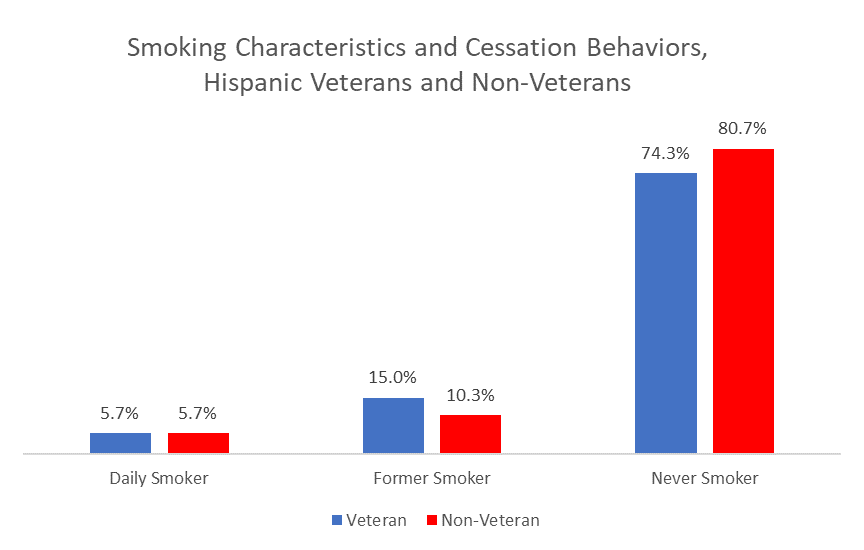Hispanic Veterans and Smoking Cessation
Hispanic Veterans and Smoking CessationLauren Korshak, DHealth(c), MS, RCEP, Office of Health Equity
|
 |
Download PDF
INTRODUCTION
The Veterans Health Administration (VHA) serves a Veteran population that is increasingly racially and ethnically diverse. Equitable access to high-quality care for all Veterans is a major tenet of the VA healthcare mission. The Office of Health Equity (OHE) champions the elimination of health disparities and achieving health equity for all Veterans.
Hispanics are the largest ethnic minority in the United States. They represent 14% of those currently enlisted in the U.S. Military and the proportion of Hispanic Veterans is expected to nearly double by 2043. Compared to Hispanic non-Veterans, Hispanic Veterans are older, more likely to be male, better educated, and more likely to be retired.
SMOKING STATUS
There are approximately 1,350,000 current smokers in the United States. Hispanics in the general population have a lower prevalence of smoking (10.7% vs 15.5%) and are lighter smokers than the general population. However, Hispanic Veterans are more likely to be current or former smokers than Hispanic non-Veterans and are more likely to smoke daily throughout their lifetime (77.4% vs 59.5%, p= 0.003).

SMOKING CESSATION
The health of Hispanic Americans is shaped by language/cultural barriers and other social determinants of health. The disparity in smoking risk observed between Hispanic Veterans and Hispanic non-Veterans gives additional weight to the notion that serving in the Military may weaken any protective effects Hispanic culture may have in reducing smoking rates compared to the general population. Veterans have cited the difficulty of coping with combat injuries and adjusting to an unstructured lifestyle as reasons for the maintenance of smoking. Health behaviors are closely connected to Hispanics’ social environment and socioeconomic status, culturally tailored public health initiatives may help improve health outcomes in the Hispanic community.
NATIONAL EFFORTS
Hispanic Veterans can benefit from programs that connect them with culturally and linguistically appropriate comprehensive smoking cessation services. VA offers tobacco treatment counseling and other cessation resources in Spanish as well as English, including the VA Quitline (1-855-QUIT-VET). Over the phone, quitline counselors help Veterans to make a quit plan and develop strategies for preventing relapse and offer continued support through follow-up calls. To reach the Quitline, call 1-855-QUIT-VET (1-855-784-8838) between 9 a.m. and 9 p.m. ET, Monday – Friday.
SmokefreeVET en Español is a text message program to support Veterans quitting smoking. Veterans who sign up receive two to five text messages each day with support, encouragement, and tips for quitting tobacco products for up to six weeks after their quit date. To sign up, text the word VETesp to 47848 or visit: https://smokefree.gov/VETesp.
A list of all tobacco cessation resources available for Veterans through the VHA Tobacco & Health National Program Office can be found here: https://www.mentalhealth.va.gov/quit-tobacco/.
JAMES A. HALEY VETERANS' HOSPITAL
At the James A. Haley Veterans’ Hospital in Tampa, Florida, the health care providers leading efforts to help Veterans quit tobacco use recognize the importance of offering their services in both English and Spanish. This ensures that Veterans receive the care that they need in the language that they prefer. The physician, who leads their smoking cessation at the main VA Medical Center is bilingual. Another bilingual provider also works with Hispanic Veterans on an individual basis and provides them counseling in Spanish and will oversee a new smoking cessation group at the Community Based Outpatient Clinic (CBOC). Finally, to ensure that all Veterans can receive access to these services, the smoking cessation team also provides Virtual Tobacco Cessation classes to three CBOC’s and all are welcome to attend.
For more information about the Office of Health Equity visit: https://www.va.gov/healthequity/
For additional OHE fact sheets visit: https://www.va.gov/HEALTHEQUITY/Publications_and_Research.asp
OHE would like to extend a special thanks to Heather Roth, Veteran Health Education Coordinator, VISN 7 at the Columbia VA Health Care System for her contributions to the development of this brief.
REFERENCES
Hammett P., et al. “Population Smoking Characteristics and Cessation Behaviors in a Nationally Representative Cohort of Hispanic Veterans and Hispanic Non-Veterans.” Mil Med. 2019 May 8 [PMID: 31067303]



















